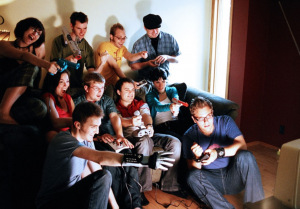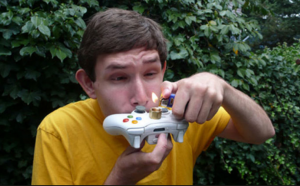Gaming
Table of Contents
1. Introduction
2. Potential Benefits
3. Potential Dangers
4. Symptoms of Danger
5. Dealing with Dangers
6. Gaming Addiction
1. Introduction
Basically, the key to gaming is to take advantage of its potential benefits, watch to make sure the dangers don’t creep in and act quickly and effectively if the dangers do creep in.
There are a surprising number of studies that have been done in gaming’s impact on teenagers:
- In the US 83% of teenage girls play video games and 97% of boys play
- The surprisingly common finding is that. for most teens it’s not a significant problem
- In fact, a surprising number of important benefits have been identified
The dangers are what would be expected:
- The amount of time spent gaming can be a problem if it interferes with other aspects of life – from health to school performance to developing relationship skills
- Too much violent content or content that objectifies or diminishes individuals or relationships is problematic
- If gaming isolates a player or replaces direct relationship interactions. That is a problem
- No set number of hours per day has been identified as a problem
The potential benefits are wide-ranging:
- There are intellectual benefits, such as multi-tasking, focusing and problem-solving
- There are social benefits, such as playing together in the same location, teamwork and topics to talk about with others
- There are emotional benefits, such as learning to manage emotions like frustration, loss and anger or simply the ability to escape painful settings
When gaming becomes a problem, it can be a serious problem:
- If it becomes a problem, it is unlikely to take care of its self
- As a teenager, you can take control, particularly by limiting your playing time – not easy to do
- As a teenager, you can also intervene with friends to help them manage their gaming
- As a parent or other adult, you may need to place limits and conditions on gaming
- If gaming becomes an addiction, outside help will almost certainly be needed
Video games are no substitute for real world pleasures (marriage, the birth of a child, spiritual enlightenment, what have you), but they do provide a nice reprieve from real world woes. Brett Weiss
Almost everyone plays. There are potential benefits and potential dangers. The key is to manage your gaming – not be managed by it.
2. Potential Benefits
The benefits can be small or large, but there are a lot of potential benefits that naturally come with gaming (as long as it’s not overdone). One factor that has been highlighted is that, as outdoor play has decreased, gaming has taken its place to some degree.
Being aware of the potential benefits and paying attention to how you might maximize them is important. If you pay attention to your gaming, you are putting yourself more in the role of being the author of your life vs. just letting gaming take you were it wants to go.
Potential Intellectual Benefits
- Quick thinking and accuracy
- Multi-tasking
- Attention and concentration
- Memory enhancement
- Flexibility – change in strategy, action, approach
- Problem-solving
Your brain is, in this sense, like your muscular system. If you exercise certain parts of it, those parts grow bigger and become more powerful. Yes, video gaming can alter the brain, but the documented effects are positive, not negative. Peter Gray, Ph.D.
Potential Emotional Benefits
- Managing emotions – managing fear, anxiety, anger, frustration (can have and deal with intense emotions in a safe place – much like play used to do)
- Can escape the outside world for a while and share it with others
- Improve moods temporarily, such as anxiety or depression
Potential Social Benefits
- Teamwork
- Social skills – playing games with others – together and/or online – also talk about gaming strategies and experience
- Persistence and resilience

Potential Physical Benefits
- Hand and eye coordination, fine motor skills
- Physical well-being – dance games, exercise games, etc.
- Stress reduction
These are natural potential benefits. Take advantage of them.
3. Dangers
The dangers are primarily in the areas of too much gaming, violent or demeaning content, isolation – and interference with the rest of life – developing into a successful young adult. These dangers can have minimal impact, moderate impact or severe impact. You can stay in control by avoiding them, managing them or recovering from the. If you become addicted, you are – by definition – out of control and will need help.

Potential Social Dangers
There is a lot of relationship development that happens in the teen years and it’s not easy. Gaming can put you in touch with others, but it can also be a way to avoid the challenges of relating to others. If you are gaming to avoid relationship challenges, that will be increasingly problematic.
- Lack of social skills development
- Lack of experience with social challenges and social skills building
- Aggression or violent behavior
- Sexual aggression
- Social isolation or restricted social connections
- Loss of interest in teams and groups
Potential Impact on Health
Too much gaming can get you into a sedentary lifestyle (too much siting – and too little exercise). That can lead to a lot of bad physical outcomes.
- Poor diet
- Lack of exercise
- Lack of sleep
- Poor posture
- Carpel tunnel syndrome
- Diabetes and other chronic conditions
Potential Emotional Dangers
Sometimes gaming can help with depression or anxiety and sometimes it can provide social connections and a sense of competence. But too much gaming can make a bunch of conditions and feelings worse.
- Increased anxiety or depression
- Insecurity in other parts of your life
- Sense of isolation
- Decreased confidence in your future
Interference with Building Competencies – Academic and Others
Gaming can increase a number of intellectual capabilities, but too much will almost certainly decrease your academic performance and interfere with building the other competencies required of a young adult.
- Fall behind – undermining future opportunities
- School becomes increasingly frustrating and painful
- Lack of motivation to develop non-academic competencies (like self-management) for succeeding in the world as a young adult
- Little time for developing competencies outside of school
Addiction
Addiction involves trying to use something outside of yourself (drugs, gaming, alcohol) to meet needs – fill gaps.
Addiction means being out of control of your life and will require intense intervention – it will be beyond your ability to recover, so get help. You will not be in the position of being the author of your life. Gaming will be calling the shots.
4. Symptoms of Trouble
Excessive gaming is not yet an official psychological disorder, but that is under discussion. There are, however, some clear signs that indicate that you might be getting into dangerous territory.
- Playing in secret or lying about how long you have been playing
- Thinking about video games when engaged in other activities
- Sacrificing time at work or school in order to play
- Playing for increasing amounts of time
- Using games to escape from reality
- Increased anxiety or depression
- Feeling guilty, ashamed, anxious, or depressed as a result of online behavior
- Feelings of restlessness and/or irritability when unable to play
- Preoccupation with thinking about previous online sessions or anticipation of the next game

- Becoming alienated from friends and family – Isolation from others in order to spend more time gaming
- Becoming irritated if unable to play
- Fatigue
- Migraines due to intense concentration or eye strain
- Weight gain or loss
- Backaches
- Carpal tunnel syndrome caused by the overuse of a mouse or controller
- Poor personal hygiene
- Neglecting sleep to stay online
- Losing interest in other activities and hobbies
How many of these signs of danger apply to you or your friends now?
5. Managing Gaming vs. Being Managed by Gaming
No man is free who is not master of himself. Epectitis
“Manage” is the key term
That doesn’t mean don’t play games. It does mean to “be in charge” of your gaming and how you conduct your life. It’s about “being the author” of your life, which is the central difference between being a child and being a young adult.
There are a few simple reminders or guidelines that can help without being prescriptive. Simple does not mean easy.
1. Focus on how you are conducting the rest of your life
Focus on how your relationships are developing; the competencies you are building; how your identity is evolving; how you are performing in school; your involvements in teams, clubs, volunteer work, paid jobs, etc.
The danger is less in gaming than it is in letting gaming take you away from developing as a young adult.
2. Limit the time you spend gaming
It can be hard to stop, so you might need to be pretty disciplined and set some limits that you follow even if you don’t feel like it.
The idea is to keep your gaming within limits, so that you can do the exploring and growing in the other areas of your life required for success.
3. Build in some support to help you stay disciplined
You can ask trusted adults to help you keep to your limits – “If I’m gaming past 8 tonight, stop me, even if I get snarky when you do.” You can also ask friends to do so, discuss how to manage your gaming with peers (help each other), etc.
Remember
These guidelines are not intended to run your life. They are designed to help you stay in charge of your life vs. losing control.
6. Gaming Addiction
Video games are designed to be as fun, interesting and engaging as possible
Whether the challenge is beating a high score, reaching new levels of play, completing a quest, or developing different roles or characters, games are simply interesting and engaging. They are designed to draw you in and keep you engaged. They can also create connections with others online or face-to-face. And they can be places/activities in which to escape problems. In other words, they are designed to be addictive.
Games aren’t designed with the intent to create teenage addicts, but they can be extraordinarily alluring and the challenge is to manage them and not be managed by them. Most teenagers don’t become addicted, but many do and many more spend more time than is healthy gaming.
Risk Factors
There are some factors that can increase your risk of becoming addicted. They certainly don’t guarantee it because you can still be the author of your life, but pay particular attention if these factors are a part of your life.
- Depression or anxiety
- ADHD
- Relationship problems or poor social skills
- Low self esteem
- Toxic environment – poor role models, abuse, addiction, etc.
These factors don’t condemn you to being addicted, but they do increase your risk.
Dual Addictions
Because video game addiction may be combined with depression, other mood disorders and substance abuse. For those suffering from dual addictions, proper treatment is essential in recovery as you will be even further out of the author role.
Dealing with Addiction
Being the Author – Getting Help – Recovering from Over-use or Addiction
Don’t assume your addiction will take care of itself or that you will “grow out of it.” Addictions take you out of the author role in your life. You are no longer in charge – at all.
If addicted or failing to manage your time gaming, you are not the author of your life and need to change that – or you can wait for others to step in. Better for you to ask for help and be part of designing the help. If you can do that, you are being the author and are already ahead.
If a gaming addiction is a response to problems in other parts of your life, find the courage to identify them (relationships, confusion about identity, depression or anxiety, falling behind in school or building competencies, etc.). And take pride in doing so because it does take courage.
The addiction will lose much of its power if you can find the areas of your life that you want to improve and take steps to improve them – even little steps. Often, addressing the addiction head-on is necessary to be able to free the attention and energy to do that.
Getting Help – Connecting
If adults act to deal with your addiction before you do, the challenge is to get into the author posture as soon as you can – probably after denying there is a problem, getting angry at the intrusion by adults and arguing for a while. Even if adults intervene, you can very rapidly partner with them and start managing your life again.
With addiction, the key is to get connected to people and organizations that can help – face-to-face and online:
- Parents (good role models, limiting time, getting you to other resources, help enriching the other parts of your life)
- Counselors/Therapists
- Peers – that can support you or peers also trying to beat an addiction (gaming, alcohol, drugs, sex)
- Gaming Anonymous
- Other trusted adults
- Organizations that treat addiction
Keep your addiction in context
You are not just a gaming addict (even if that is the dominant issue in your life right now). There are a lot of elements that combine to make up your identity, so don’t lose track of those (see the section on the core challenge on identity as a reminder).
